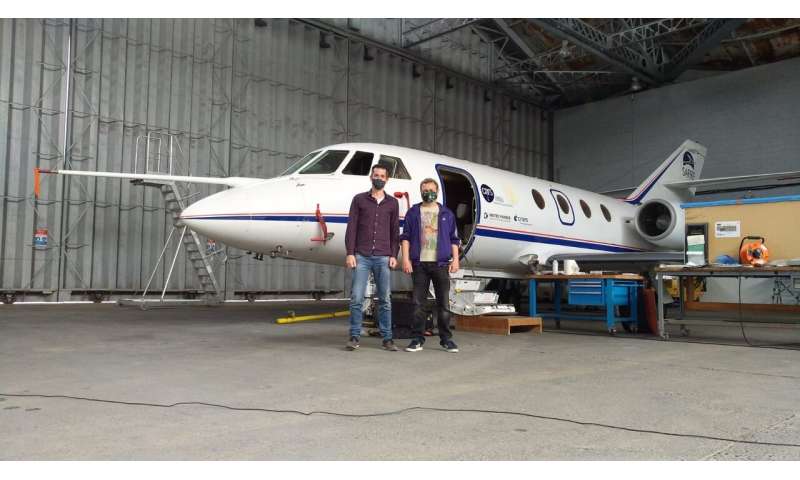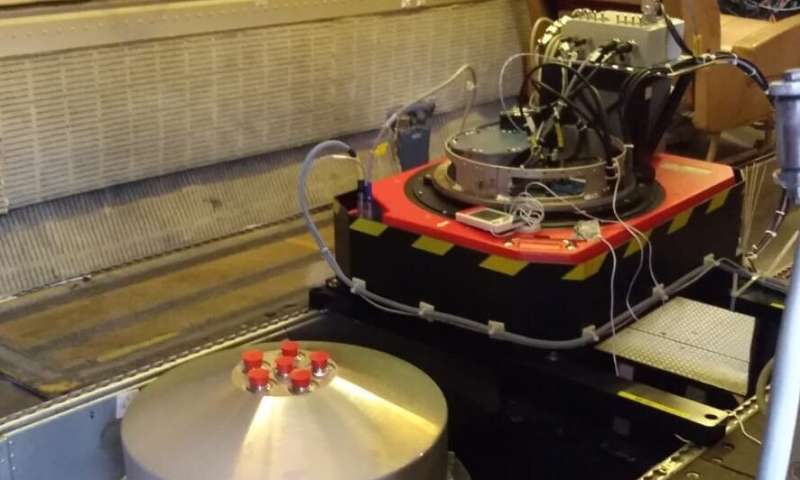Aerosol instrument starts measurement campaign in European airspace
by SRON Netherlands Institute for Space Research

Electrical Engineer Rob Wolfs (left) and Software Engineer Jens Johanson (right) in front of the Falcon-20 research airplane in Toulouse. Credit: SRON
SRON's aerosol instrument SPEX Airborne is spreading its wings again. On October 2, it will start a series of measurement flights across Europe onboard a Falcon-20 research aircraft. SPEX Airborne will measure aerosols in the atmosphere—tiny dust particles that can disrupt measurements of the greenhouse gas CO2. In time, SPEX is intended to go into space as part of the European SCARBO mission.
Europe is committed to measuring CO2 emissions from space in order to achieve the European Green Deal targets. In addition to the future CO2 space mission CO2M, the European Commission is funding a collaboration of 10 organizations, including SRON, that are working on a constellation of smaller satellites called the Space CARBon Observatory (SCARBO). A new miniature CO2 measuring instrument, nanoCarb, has been developed for SCARBO in France. The Dutch SPEX Airborne is part of SCARBO, intended to correct the CO2 measurements for disturbances caused by aerosols. Before these instruments go into space, they first perform a series of measurement flights from Toulouse on the Falcon-20.
A team of SRON engineers has already arrived in Toulouse to install SPEX Airborne in the Falcon-20 aircraft. "After the installation, one or two test flights will be carried out over France," says Martijn Smit from SRON. "Then it gets exciting, because we'll see whether everything functions properly. If the test flight goes well, the real work begins."
There will be flights over Poland and Germany above a number of power plants with high CO2 emissions. The aircraft will also fly across Northern Italy and Southern Spain—regions with often increased concentrations of aerosols.

Provided by SRON Netherlands Institute for Space Research
SRON's aerosol instrument SPEX Airborne is spreading its wings again. On October 2, it will start a series of measurement flights across Europe onboard a Falcon-20 research aircraft. SPEX Airborne will measure aerosols in the atmosphere—tiny dust particles that can disrupt measurements of the greenhouse gas CO2. In time, SPEX is intended to go into space as part of the European SCARBO mission.
Europe is committed to measuring CO2 emissions from space in order to achieve the European Green Deal targets. In addition to the future CO2 space mission CO2M, the European Commission is funding a collaboration of 10 organizations, including SRON, that are working on a constellation of smaller satellites called the Space CARBon Observatory (SCARBO). A new miniature CO2 measuring instrument, nanoCarb, has been developed for SCARBO in France. The Dutch SPEX Airborne is part of SCARBO, intended to correct the CO2 measurements for disturbances caused by aerosols. Before these instruments go into space, they first perform a series of measurement flights from Toulouse on the Falcon-20.
A team of SRON engineers has already arrived in Toulouse to install SPEX Airborne in the Falcon-20 aircraft. "After the installation, one or two test flights will be carried out over France," says Martijn Smit from SRON. "Then it gets exciting, because we'll see whether everything functions properly. If the test flight goes well, the real work begins."
There will be flights over Poland and Germany above a number of power plants with high CO2 emissions. The aircraft will also fly across Northern Italy and Southern Spain—regions with often increased concentrations of aerosols.

Credit: SRON
This campaign will be the first time that CO2 and aerosol are measured simultaneously.
The SCARBO consortium is led by Airbus Defense and Space in France. The project draws funding from the Horizon 2020 program of the European Commission. SRON and Airbus Defense and Space Netherlands are also currently developing the spectropolarimeter SPEXone for the NASA satellite mission PACE, which will be launched in 2023.
Explore further SPEX project gets wings: first measurements SPEX airborne published
This campaign will be the first time that CO2 and aerosol are measured simultaneously.
The SCARBO consortium is led by Airbus Defense and Space in France. The project draws funding from the Horizon 2020 program of the European Commission. SRON and Airbus Defense and Space Netherlands are also currently developing the spectropolarimeter SPEXone for the NASA satellite mission PACE, which will be launched in 2023.
Explore further SPEX project gets wings: first measurements SPEX airborne published
Provided by SRON Netherlands Institute for Space Research
No comments:
Post a Comment